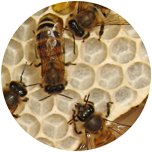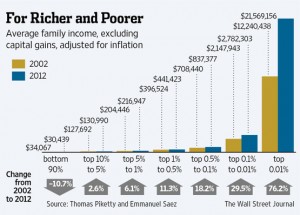Let me start this with a confession. I am a fiscally conservative radical leftist—and I think we need a new understanding of how an economy should serve society, and what sort of society we want our economy to serve.
Our economy got personal this morning. My clock radio woke me to the news that Canada Post is ending door-to-door mail service, with a loss of 8,000 jobs. This is personal because I know two people who are waiting to be posties. One is a friend, a past postie with seniority, but who moved to a different town and is now waiting and hoping to get a route. Another is our neighbour who is taking night classes and working several jobs, one of which is as an on-call postal carrier.
So, two women I am in contact with several times a week will be impacted by this change. And by impacted I don’t mean they will have to go to fine restaurants less often, I mean they may end up in serious financial trouble. They may have a hard time paying the rent. They may end up making hard choices about feeding their children.
Now, this is the reality of change, change is pain. I am not specifically arguing for door to door mail service. But I do think we need to talk about it, and because I am a radically leftist fiscal conservative, I am not going to toe any party lines.
So, here are my assumptions:
We are oil
Humanity muddled along for millennia; population was pretty stable and life was mostly subsistence. Then coal and oil began to be used on grand scales and the chart of everything went through the roof—population, mining, manufacturing, farming, fish extraction, it all went exponential. Everything requires energy and fossil fuels allowed the economy to expand beyond the limits of today’s sunshine. An expanding economy created surplus food, and surplus food was turned into more people.
Wealth
Wealth is not numbers in your bankbook. Wealth is the products of nature; the metals, woods, animals, plants and fishes. Wealth is also created when humans work natural resources. Nature makes salmon, which we fish and eat, but our leftovers begin to rot and we lose that wealth. So when we add the labour to dry and smoke salmon, we create a new kind of wealth.
What is not wealth is the finance industry. Wealth is actual real things, the products of nature that feed and shelter us, and the products we make from the products of nature. The financial industry is just a shell game, a carnival attraction that suckers the rubes with a ring toss. Sure, you can currently exchange “financial instruments” for real wealth, but until you do that they are not wealth.
Also, knowledge is not wealth. Knowledge is great, and knowledge can help us smoke our salmon better, but until the salmon is actually smoked, you don’t have any wealth. You can’t eat dollar bills, and you can’t eat ideas.You also can’t eat TED Talks, even if they are Ideas Worth Spreading.
Fossil fuels are a product of nature and are real wealth. They also allow us to transform the products of nature at a scale millions of times greater than we could with sunshine.
Please note I am not saying that is a good thing. Wealth is not necessarily a good thing. But it is real, and that is why I am a fiscal conservative. I believe our world is finite, and our wealth comes from our world, therefore our wealth is finite. We should spend it wisely.
The Barrel
Oil no longer gushes from the ground. There are virtually no giant, straight old-growth trees. Most of our fisheries have disappeared or are dwindling rapidly. We have become so proficient at harvesting the wealth of nature that we are having difficulty figuring out what to do next.
So let me be clear. We are scraping the bottom of the barrel.
Fracking for gas and oil is a sign of system failure. This isn’t innovation, this is desperation—there is no other reason we would use such crazy and expensive techniques.
Engineered wood products are a sign of failure. Really? We need to make boards from grass? We wouldn’t be doing this if we weren’t desperate.
Salmon farms are a sign of failure. Salmon used to jump into our boats. The First Nations say there were so many fish you could walk across rivers on the backs of salmon. Salmon cross the oceans eating and exercising to create that perfect, delicious meat—but now we spoon-feed them pablum like babies? Why would we hoover up the sardines and rockfish from South America to grind up and feed the farms if we were not desperate?
We are scraping the bottom of the barrel, and a barrel is a perfect analogy. It is perfect because it is made of wood from a tree that has been shaped by humans to hold more bounty of nature. It is a real thing. It is wealth. And when a barrel is empty, it is actually empty and there is nothing more inside it. This is in sharp contrast to those knowledge workers, the economists, who insist the market will substitute once price signals are sufficient.
Well, there is no substitute for Atlantic Cod, or for old-growth fir, or the deep soils of the plains and river deltas. Wealth is real things, and when we run low, we desperately scrape at the bottom of the barrel. And after we have scraped…the barrel is empty. You can’t eat ideas, even if you have millions and millions of them.
I took this long digression from Canada Post because the people who deliver our mail need real wealth to eat and keep their family warm, but we are scraping the bottom of the barrel.
This morning’s news, plus a list of other layoffs I read last night and the myriad identical stories from around the world, are signs of system failure. We didn’t have layoffs when oil was cheap and plentiful, there were new fields to plough and every tree you could cut was turned into new houses in new subdivisions. But we are scraping the bottom of the barrel. Our real wealth is diminishing.
Our real wealth is diminishing. I am sorry it took me so long to say that simple sentence. Our real wealth is diminishing. We are in the time of contraction. I think most of us know that in our hearts, even if we numbly repeat the mantra that growth will return.
Our real wealth is diminishing and the gap between rich and poor is widening and hardening. The poor design of this chart hides the number of people hurt by this. 90% of U.S. families have lost 11% of their income, while the richest 10% have made untold billions.
This is not because 90% of people are lazy. This is because the motivational story we tell about our economy does not work in a world of diminishing wealth. Bootstrapping yourself up seldom grants access to the heights of society, but it works well when even the middle class enjoys great luxury. But the middle class is losing their luxurySadly, they are fighting to keep it by clawing at the poor instead of the rich—but that is another story. as the very rich accumulate more.
As we look around the world we see the rich nations falling in all measures. Even the sacred cow of Life Expectancy has dropped and is not rebounding. The free market, and especially globalization, have proven very good at draining the barrel, but not so good at floating all boats. And now the tide is going out and most of the boats are lying on the sand. The right-wing prescriptions have failed.
But, because our real wealth is diminishing, I don’t think we can take the liberal approach of increasing national debt to stimulate the economy. We don’t need stimulation, we are scraping the bottom of the barrel. We need to learn to live with, and share, what is left in barrel.
So that is my first thing. We should share. Making money is only possible thanks to the investments we have all made in shared roads, shared energy systems, shared legal and monetary systems, et c., et c., and therefore the profits should be shared back. I believe in minimum wages, maximum wages and Guaranteed Annual Incomes. All humans are born equal, and I think we should die having lived with equal amounts of health care, dental care, food, shelter and dignified work.
So, how do we share our diminishing wealth? I am flabbergasted that my city mows my boulevard, vacuums up fallen leaves and carries my garbage out of my backyard for me. The city is nearly bankrupt, and yet I am not expected to compost my own leaves. Similarly, I don’t really mind the idea of walking down to the mailbox. I grew up on a rural route, and can easily cope with an urban mailbox.
Which means we could fire a bunch of city workers, 8,000 posties, and probably millions more who work in jobs created in an expanding economy.
The thing is, I don’t want these thousands of people to try to join the bullshit knowledge economy, or try to compete in globalized industry. I don’t want them to be hungry or fearful. I don’t want them to be ashamed.
I want them to create wealth.
So, I am speaking out for the posties today. I am speaking out for the foundry workers and the furniture builders and the resource towns dying all over this country. I am not saying we should save their industries or support their towns or fossilize any other social structure. But I am saying I think an economy should organize the sharing of our diminishing wealth.
We are in a new era now, and our economy should serve us, not make the situation worse.


[…] But I haven’t been idle. Canada Post announced it will be ending door-to-door mail delivery, and I announced The Howl of a Fiscally Conservative Radical Leftist: First they came for the Posties, and I didn’t speak out because I wasn’t a Postie… […]
“Wealth is not numbers in your bankbook.”
I very much agree with this. Most of us are so captivated by the abstraction of money (and the pursuit of it) that it borders on delusional. We need new currencies that respect natural wealth and aren’t innately geared towards the banks and against the everyperson. I think time credits certainly seem a fairer option.
Thanks for your comment. I have been fascinated by the idea of demurrage.
http://p2pfoundation.net/Demurrage
[…] First they came for the Posties, and I didn’t speak out because I wasn’t a Postie… […]
[…] First they came for the Posties, and I didn’t speak out because I wasn’t a Postie… […]